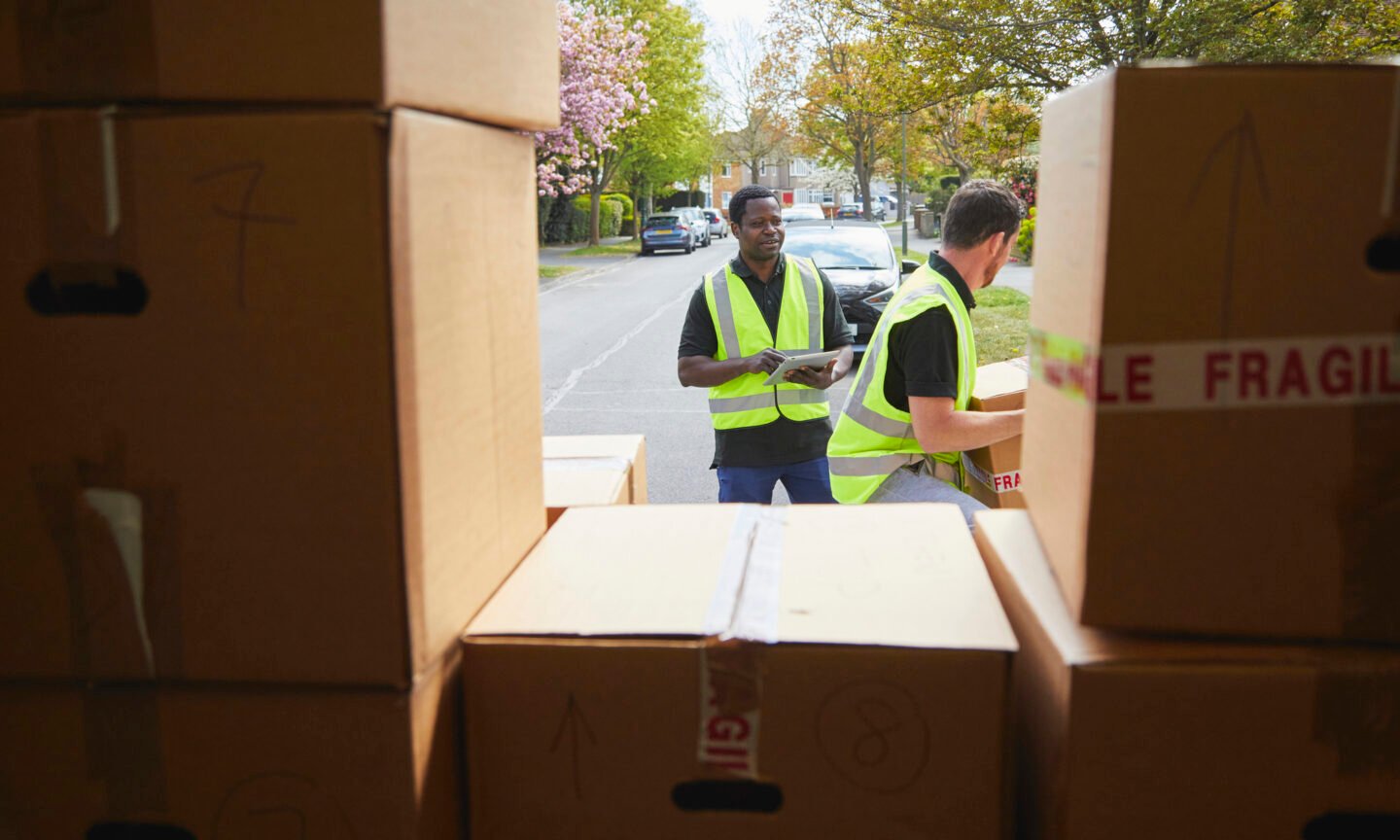Movers typically won’t move items that could be unsafe to transport – for the item or for the movers.
Each moving company has its own rules for what they will and won’t move, but most tend to avoid landscaping chemicals, ammunition, plants, cleaning supplies, perishable foods, fireworks, candles and pets. Additionally, it’s best not to have movers handle valuables, heirlooms and personal documents.
If you have items on the do-not-move list, consider alternative methods, or which items may be best just to sell, give away, or safely discard.
Here are the most common items not to move, why movers won’t transport them and what to do instead.
Movers won’t transport dogs, cats, birds, lizards, rabbits, snakes, hamsters, gerbils or any other living creatures.
Why not?
A moving truck isn’t a safe environment for pets because the inside of a moving truck can be very hot and lack air flow. Additionally, heavy items might fall on your pet during the drive. At best, the ride in the back of a moving truck would be really scary for your pet; at worst, it could injure or even kill them.
What to do instead
Most people just bring their pets along on their trip. This way, your pet has the comfort of being near you for the entire time, which should help make the stress of a move less traumatic for them. On long-distance moves that involve overnight travel, you can find pet-friendly hotels along the way.
If traveling with your pet truly isn’t an option, consider hiring a professional USDA-certified pet transport service to get your animal friend safely to your new home.
While you may find a local mover who’ll take your plants along, movers generally won’t transport plants.
Why not?
There are a number of reasons most movers won’t move plants, particularly on interstate moves:
State laws typically prohibit moving plants across state lines.
Non-native plants have the potential to harm native plants in your new state.
Living plants and their soil may be home to larvae, eggs and insects that might infest the moving van and its contents.
The truck’s temperature, humidity and lack of light could harm your plants.
What to do instead
If you’re driving to your new home, you can bring your plants with you, but make sure to wrap them carefully for the journey to avoid any mess in your car. For long-distance moves where bringing your plants isn’t practical, consider gifting them to friends, family, and local hospitals, nursing homes or schools.
Your movers will likely accept packed non-perishables such as canned foods and spices. However, if you have milk, yogurt, casseroles, ice cream and other perishable food in your fridge or freezer on the morning of your move, don’t expect your movers to load it onto the truck.
Why not?
Movers won’t generally take perishable foods for the following reasons:
The environment on the truck won’t keep the food fresh.
Food that melts or spoils during transit could cause odor and damage to the truck and its contents.
As food spoils, it may also attract insects that could infest other items on the truck, such as your clothing, furniture and bedding.
What to do instead
Try to plan ahead so you’ll have very few perishables left on moving day. For a short move, you may be able to take some of your perishables along with you in a cooler. If that’s not practical, consider giving fresh, unopened perishables to friends and neighbors.
You can also donate any unopened non-perishable food you don’t want to move to a local food bank. If your mover participates in Move for Hunger, a nonprofit organization that coordinates with your movers, they can pick up your unwanted food and deliver it to a food bank for you.
4. Firearms and ammunition
Movers generally prohibit or restrict the transport of firearms and ammunition. You can discuss gun transport with prospective movers to see if they’d be willing to transport unloaded firearms.
Why not?
It can be dangerous to transport firearms or ammunition. Gun laws are also state-specific.
What to do instead
If your moving company won’t transport your firearm, a federally licensed firearm dealer can ship it to your new address.
Call a moving coordinator at Safeway Moving Systems Inc.
Other services offered
Packing, unpacking, storage and debris removal.
Customer ratings
Average
Based on Better Business Bureau rating and number of complaints per 100 vehicles to the BBB and Department of Transportation.

Call a moving coordinator at North American Van Lines
Other services offered
Packing, car shipping, unpacking, storage and debris removal.
Customer ratings
Average
Based on Better Business Bureau rating and number of complaints per 100 vehicles to the BBB and Department of Transportation.

Call a moving coordinator at United Van Lines
Other services offered
Packing, car shipping, unpacking, storage and debris removal.
Customer ratings
Better than most
Based on Better Business Bureau rating and number of complaints per 100 vehicles to the BBB and Department of Transportation.
5. Cleaning supplies and other hazardous household substances
Movers won’t transport hazardous materials, and that often includes many cleaning supplies and other common household substances. Here are some of the many items typically considered too hazardous for your mover to load onto the truck:
Cleaning detergents and liquids like window cleaners.
Paint, paint thinner and solvents.
Why not?
Many of these items, including everyday cleaning supplies, are considered flammable and pose a serious risk if the truck was involved in an accident or they ignite during transport. Additionally, containers may pop open or spill during transport, causing damage to the truck or your personal items.
What to do instead
Evaluate what you really need to bring to your new home, and carefully transport these items yourself. It’s best not to try and sneak hazardous items into mislabeled boxes, because that would make you liable if there was an accident that caused harm or damage.
Anything too dangerous or inconvenient to bring yourself can be properly disposed of, donated or gifted to friends and neighbors.
Movers won’t generally take many of the products you use to maintain your lawn and property. These may include:
Why not?
These substances are all considered hazardous or flammable and pose a risk to the truck, its crew and its contents.
What to do instead
If you want to take these items to your new home, you’ll need to transport them yourself. Otherwise, you can gift them to friends and family, or dispose of them responsibly. Organizations like Earth911.com can help you find environmentally friendly recycling options.
It may come as a surprise that ordinary wax candles appear on many movers’ prohibited items lists, and movers generally won’t transport them.
Why not?
It can get very hot inside a moving truck, causing the candles to melt. Melted wax may create a mess in the truck’s storage area and damage other items on the truck.
What to do instead
If you want your candles in your new home, pack them in your own car and turn on the air conditioner if it gets too hot. If taking candles along isn’t feasible, consider giving them to friends and family or donating them to local organizations and businesses.
Most movers won’t transport any fireworks you have at home.
Why not?
By definition, fireworks are flammable. They also contain chemicals like sulfur, potassium nitrate, alcohol and coloring chemicals that movers may prohibit. Fireworks pose a safety risk to movers and could damage the truck or its contents if they ignite and explode. Additionally, each state has its own regulations about fireworks, which complicates moving them across state lines.
What to do instead
If you’re moving locally, you can drive your fireworks to your new home. For long-distance interstate moves, research state laws to find out if you can legally transport them.
If you can’t bring your fireworks, either give them to adult friends and family, or have a moving party where you safely and responsibly put on a little fireworks display. If you don’t want to use, transport or give away your fireworks, soak them in water for at least a few hours before disposing of them.
Items it’s better not to let movers move
Even though you can technically have certain items moved, that doesn’t mean it’s wise to do so. Important documents, valuables and irreplaceable items of sentimental value are safest traveling with you.
Here are a few things you should keep with you throughout your move:
Jewelry, coin collections, other valuables and heirlooms.
Birth certificates, deeds, passports and other important personal documents.
Financial, banking and tax documents.
Medical and dental records.
Personal videos and photos.
























